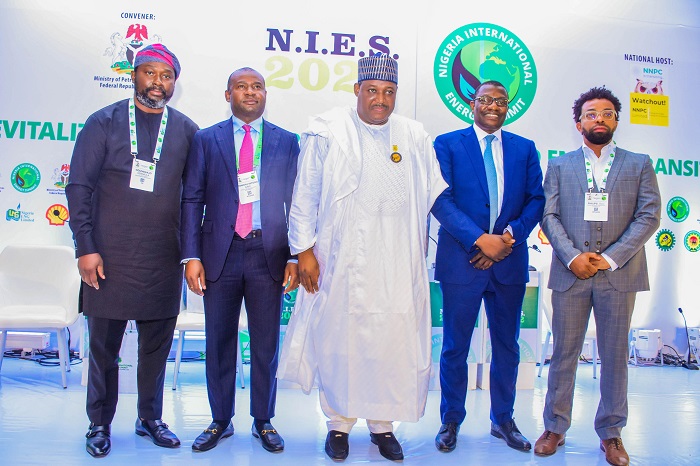From L – R: Ademola Ogunbanjo, Executive Vice President, Oando Clean Energy Limited (OCEL); Eric Monchu Intong, Regional Chief Operating Officer, Afreximbank; Dr. Nasir Sani-Gwarzo, Permanent Secretary, Ministry of Petroleum Resources; Mr. Bala Wunti, GMD, National Petroleum Investment Management Services (NAPIMS); and Olu Phillips, Senior Broadcast Journalist , Channels Television at the recently concluded Nigeria International Energy Summit (NIES) sponsored by Oando and other energy companies, in Abuja.
For the first time in history, we must tackle a truly global problem, climate change. Energy transition away from fossil fuels is imperative, but there is no consensus on how to achieve this. Many of the world’s largest economies have adopted targets for net-zero emissions of greenhouse gases by 2050. A fundamental question for Africa is, ‘as the pressure mounts for regions, countries, and companies to meet the Paris Agreement targets on eliminating carbon emissions, where does the continent stand?’ This topic formed the crux of discussions at the recently concluded Nigeria International Energy Summit (N.I.E.S.) 2022, held in Abuja.
Addressing attendees at the opening ceremony of the event, the Nigerian Minister of State for Petroleum Resources, Chief Timipre Sylva, highlighted Africa’s energy resource problems, its socio-economic implication, and the contributory impact of the energy transition on the continent. He pointed out, “The continent is indeed blessed with multiple energy sources, fossil and non-fossil fuels. Despite this, about 600 million people in Africa lack access to electricity; and about 900 million people are without access to clean cooking fuels. Coupled with the above is a current drive towards the energy transition, threatening further aggravation of energy poverty in Africa.
While the Minister of State for Petroleum Resources noted the need for the energy transition to enable cleaner energy, he pointed out that oil would still retain major relevance in the world energy market for another 22 years, even as gas comes in a close second.
According to Chief Sylvia, “OPEC’s long-term projection is that oil will remain the fuel with the largest share of the global energy mix, constituting about 28% of global energy requirements by 2045. Gas is expected to be the second-largest fuel in the energy mix, constituting about 24% by 2045. The implication is that more investment will continue to be required in the oil and gas industry to meet these projected demands, especially in developing countries.”
He and others including the former Governor of Cross River State, Donald Duke; and Vice President, Yemi Osinbajo see gas as the obvious way to produce cleaner energy while satisfying pent-up demand for power in a country where nearly half the population has no access to electricity.
The Former Governor of Cross River State, Donald Duke has argued that it is “ridiculous” that Nigeria, which has the world’s ninth-largest proven gas reserves, has for decades been flaring hundreds of millions of cubic feet of gas daily. Common sense will tell you that, if you’re able to pipe all that energy, and distribute it throughout the country and localise the generation of power, we would be an energy-surplus country.” He said, “Gas could be our competitive advantage.”
In an article in the journal Foreign Affairs, Vice President, Yemi Osinbajo reinforced the importance of gas in Africa’s energy mix. He said, “The transition must not come at the expense of affordable and reliable energy for people, cities, and industry.”
Going by today’s trends, Nigeria’s gas ambitions are, however, likely to rub against the changing priorities of western banks and donors, which are being pressured by shareholders and governments to abandon lending to hydrocarbons projects.
Speaking on a panel session themed, “Energy Transition: Finance & Investment in Light of Current Realities” Ademola Ogunbanjo, Executive Vice President, Oando Clean Energy Ltd, explained that only a month ago the European Commission labelled nuclear and gas as sustainable energy. He said, “as oil becomes more and more of an investment pariah, gas needs to remain attractive.”
Mr. Ogunbanjo explained that Oando Clean Energy Limited (OCEL), the renewable energy subsidiary of Oando Energy Resources, is positioned to support the efforts of the Nigerian government to curate an indigenous approach to the energy mix that works based on Nigeria’s and the continent’s available natural resources to grow the Nigerian renewable energy space.
Speaking on funding of the growth of the renewable sector, he said, “the funds from oil and gas will be a facilitator for the growth and scale of the renewable energy sector, especially for oil-dependent nations like Nigeria. That mix is going to stay for the next 50 to 100 years. What we will see, however, for our sake, the environment, and incoming generation, is that Nigeria must begin to invest more in renewables, reduce investments in coal, reduce investments in oil and scale-up gas, so that in the next two to three decades, renewables and gas will provide more of the energy that the country will supply to the world”.
Digging deeper into the energy transition subject for a more definitive direction, another panel session at the NIES event focused on, “Strategies for Confronting the Energy Transition” with speakers like Dr. Ibe Kachikwu, Former Minister of State for Petroleum Resources, Mr. Mele Kolo Kyari, GMD, NNPC, as well as several principals of major IOCs in Nigeria.
Led by Timipre Sylva, Minister of State for Petroleum Resources, Nigeria, the strategy session explored the implications of the energy transition as well as the broad strategies required to revive the industry’s fortune to chart a pathway for the future. These strategies include investments in physical infrastructure, establishing medium and long-term integrated energy planning, etc., all guided by policies and regulations to boost sustainable development.
Ultimately, indigenous companies must band together to support the efforts Nigerian government and Africa by extension, to curate a customised approach to the energy mix that works for Africa. This can be achieved when wealth is generated using accessible natural resources to invest in and grow the renewable energy space.


Comment here